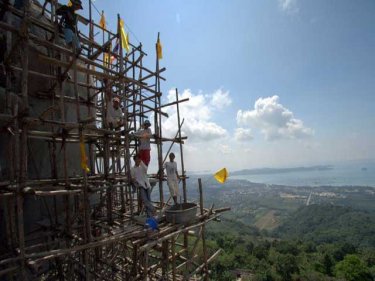AUTHORITIES on Phuket are considering ways of combining their computer records on Burmese workers with those of farangs and other non-Thais on work permits and long-term tourist visas.
Thais from other provinces could also be included.
The access to a complete data base would enable more departments to instantly check on the status of the person they were dealing with.
There are 7746 ''foreign'' residents on work permits, according to Vice Governor Worapoj Rattasima. These permits are traditionally dealt with by the Department of Employment.
Long-stay tourists deal with Immigration.
A total of 29,264 Burmese, Laotians and Cambodians also have permits to work, mostly in construction, on plantations or as house maids. These are traditionally dealt with by the Provincial Employment Office.
Phuketwan understands that the Vice Governor recently met with representatives from Immigration, the Marine Police, Tourist Police and Phuket City police, along with the Employment office.
The concept of an open data base would improve security and safety, the Vice Governor believes.
While the different groups would be on the same data base, categories would separate the different kinds of Thai and non-Thai workers and their status on Phuket.
Groups would include contract laborers, people on long-term tourist visas and work permits, and a ''VIP group.'' The rationale for entry to the ''VIP group'' has yet to be clarified.
The data bases are expected to be combined before September.
It could be that there may be a distinction between ''foreign'' workers and ''alien'' workers, the two terms often used for non-Thai groups of workers and residents.
Coincidentally, the number of Burmese who would usually be expected to register for work in June has dropped.
A total of 19,540 positions were available on Phuket to Burmese workers who were able to register during the month of June. But only 13,855 positions were filled. Another 7783 contract workers registered in February.
Nataya Anudit, the Chief of Phuket Provincial Employment Office, believes the island needs another 20,000 legal contract workers to meet the needs of the construction industry.
However, she says the turnover of Burmese workers has been triggered by higher salaries being available in Bangkok and Pattaya especially.
It could also be that some have returned home to check on relatives in the aftermath of Cyclone Nargis.
The Governor of Ranong, Kanchana Pakeemun, told Phuketwan recently that many Burmese came to Ranong and started working in local shrimp factories at low wages.
They improve language skills and move south to Phang Nga or Phuket and better-paid work.
The same, it seems, now applies on Phuket. Construction workers look to better-paid jobs in resorts or in other destinations.
Coincidentally, the governor told Phuketwan that the city of Ranong was home to 180,000 Thais and 100,000 Burmese.
Despite the blaming of Burmese on Phuket for crimes of all kinds, Khun Kanchana said Ranong was peaceful, and both Thais and Burmese coexisted well.
The local Tesco-Lotus has signage in Thai, Burmese and English, with local cable tv also carrying the main Burmese channel.
There was no indication that Burmese were particularly responsible for what crimes existed there. Burmese workers boosted the local economy, the governor said.
And they are not subject to an 8pm curfew, as they are on Phuket. They are permitted to use mobile phones, unlike on Phuket.
But they are not allowed to ride motorcycles, so many are seen on bicycles.
The Ranong governor has started to implement a new registration program that allows her to track the identity and whereabouts of the vast majority of Burmese, who are not on work permits.
A total of 17,000 of Ranong's 100,000 Burmese have work permits. The governor hopes to eventually register the other 83,000.
It is understood that the 54 Burmese who suffocated in a container truck load of 121 Burmese as they headed south to Phuket earlier this year only became illegal once they left Ranong.
Phuket's new police chief, Major General Apirat Hongtong, has just returned to the island after spending time as police chief in Ranong, where he says his efforts reduced crime to ''zero.''
He has promised to achieve a similar result on Phuket.
Ranong this year joined the other tourist provinces of Phuket, Phang Nga and Krabi in the Andaman Group.
One benefit may be a common approach on issues such as the registration of Burmese and other non-Thai workers.
What do you think about visas and work permits on Phuket? Tell us now by commenting below. It's easy!
Related Artices:
Comeback Police Cheif Promises Crime Free Phuket
Phuket Bid to Make 20000 Extra Burmese Legal
Exile Island Plan: 200 Burmese in Jail
New Immigration HQ on Phuket Will Be Visa Heaven
Thais from other provinces could also be included.
The access to a complete data base would enable more departments to instantly check on the status of the person they were dealing with.
There are 7746 ''foreign'' residents on work permits, according to Vice Governor Worapoj Rattasima. These permits are traditionally dealt with by the Department of Employment.
Long-stay tourists deal with Immigration.
A total of 29,264 Burmese, Laotians and Cambodians also have permits to work, mostly in construction, on plantations or as house maids. These are traditionally dealt with by the Provincial Employment Office.
Phuketwan understands that the Vice Governor recently met with representatives from Immigration, the Marine Police, Tourist Police and Phuket City police, along with the Employment office.
The concept of an open data base would improve security and safety, the Vice Governor believes.
While the different groups would be on the same data base, categories would separate the different kinds of Thai and non-Thai workers and their status on Phuket.
Groups would include contract laborers, people on long-term tourist visas and work permits, and a ''VIP group.'' The rationale for entry to the ''VIP group'' has yet to be clarified.
The data bases are expected to be combined before September.
It could be that there may be a distinction between ''foreign'' workers and ''alien'' workers, the two terms often used for non-Thai groups of workers and residents.
Coincidentally, the number of Burmese who would usually be expected to register for work in June has dropped.
A total of 19,540 positions were available on Phuket to Burmese workers who were able to register during the month of June. But only 13,855 positions were filled. Another 7783 contract workers registered in February.
Nataya Anudit, the Chief of Phuket Provincial Employment Office, believes the island needs another 20,000 legal contract workers to meet the needs of the construction industry.
However, she says the turnover of Burmese workers has been triggered by higher salaries being available in Bangkok and Pattaya especially.
It could also be that some have returned home to check on relatives in the aftermath of Cyclone Nargis.
The Governor of Ranong, Kanchana Pakeemun, told Phuketwan recently that many Burmese came to Ranong and started working in local shrimp factories at low wages.
They improve language skills and move south to Phang Nga or Phuket and better-paid work.
The same, it seems, now applies on Phuket. Construction workers look to better-paid jobs in resorts or in other destinations.
Coincidentally, the governor told Phuketwan that the city of Ranong was home to 180,000 Thais and 100,000 Burmese.
Despite the blaming of Burmese on Phuket for crimes of all kinds, Khun Kanchana said Ranong was peaceful, and both Thais and Burmese coexisted well.
The local Tesco-Lotus has signage in Thai, Burmese and English, with local cable tv also carrying the main Burmese channel.
There was no indication that Burmese were particularly responsible for what crimes existed there. Burmese workers boosted the local economy, the governor said.
And they are not subject to an 8pm curfew, as they are on Phuket. They are permitted to use mobile phones, unlike on Phuket.
But they are not allowed to ride motorcycles, so many are seen on bicycles.
The Ranong governor has started to implement a new registration program that allows her to track the identity and whereabouts of the vast majority of Burmese, who are not on work permits.
A total of 17,000 of Ranong's 100,000 Burmese have work permits. The governor hopes to eventually register the other 83,000.
It is understood that the 54 Burmese who suffocated in a container truck load of 121 Burmese as they headed south to Phuket earlier this year only became illegal once they left Ranong.
Phuket's new police chief, Major General Apirat Hongtong, has just returned to the island after spending time as police chief in Ranong, where he says his efforts reduced crime to ''zero.''
He has promised to achieve a similar result on Phuket.
Ranong this year joined the other tourist provinces of Phuket, Phang Nga and Krabi in the Andaman Group.
One benefit may be a common approach on issues such as the registration of Burmese and other non-Thai workers.
What do you think about visas and work permits on Phuket? Tell us now by commenting below. It's easy!
Related Artices:
Comeback Police Cheif Promises Crime Free Phuket
Phuket Bid to Make 20000 Extra Burmese Legal
Exile Island Plan: 200 Burmese in Jail
New Immigration HQ on Phuket Will Be Visa Heaven





Dear Sidasathian and Morison,
I am trying to find information on the demographics of Burmese located in Phuket ie. largest density, size of the various Burmese communities in Phuket, where is the pop of Burmese growing fastest in Phuket and in Thailand. What sort of work do they do? Are there community centers or central points for the community?
Thanks,
Christina
Posted by Christina on March 21, 2009 12:10